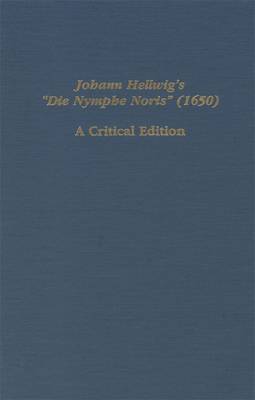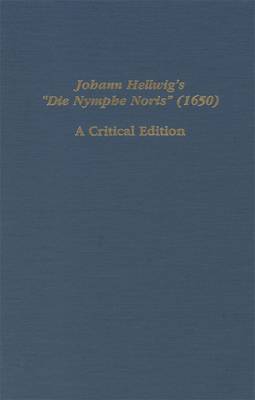
En raison d'une grêve chez bpost, votre commande pourrait être retardée. Vous avez besoin d’un livre rapidement ? Nos magasins vous accueillent à bras ouverts !
- Retrait gratuit dans votre magasin Club
- 7.000.000 titres dans notre catalogue
- Payer en toute sécurité
- Toujours un magasin près de chez vous
En raison de la grêve chez bpost, votre commande pourrait être retardée. Vous avez besoin d’un livre rapidement ? Nos magasins vous accueillent à bras ouverts !
- Retrait gratuit dans votre magasin Club
- 7.000.0000 titres dans notre catalogue
- Payer en toute sécurité
- Toujours un magasin près de chez vous
Johann Hellwig's Die Nymphe Noris (1650)
A Critical Edition
132,95 €
+ 265 points
Description
Definitive text of important prose eclogue, Baroque German's contribution to western literary genres. Prose eclogue, invented by Martin Opitz and perfected in Nuremberg during the 1640s, is perhaps the only original contribution of the German Baroque to the catalogue of western literary genres. Recently, Baroque scholars have recognized that the little-known Die Nymphe Noris, composed in 1650 by the physician and early Pegnitz Shepherd Johann Hellwig (1609-1674), a sequel to the paradigmatic works by Georg Philipp Harsdörffer, Johann Klaj and Sigmund von Birken, is in fact their equal, a highly inventive artifact worthy of serious attention in its own right: Noris forcefully exploits the negative potential of the Vergilian pastoral tradition to criticize blood nobility's privileged status vis-à-vis the nobilitas literata. Working from copies in both Europe and America, Professor Reinhart has established a definitive critical edition of the text (previously only available in the U.S. and U.K. on microfilm), including an introduction outlining the use of prose eclogue as a vehicle for the social mission of the early Pegnesischer Blumenorden. This book will be of interest to literary and cultural historians of early modern Germany, especially Nuremberg, to scholars of the European Baroque and European culture, and to bibliophiles. PROFESSOR REINHARTis associate professor of German at the University of Georgia.
Spécifications
Parties prenantes
- Editeur:
Contenu
- Nombre de pages :
- 296
- Langue:
- Anglais
- Collection :
- Tome:
- n° 1
Caractéristiques
- EAN:
- 9781879751637
- Date de parution :
- 09-06-94
- Format:
- Livre relié
- Format numérique:
- Genaaid
- Dimensions :
- 152 mm x 231 mm
- Poids :
- 566 g

Les avis
Nous publions uniquement les avis qui respectent les conditions requises. Consultez nos conditions pour les avis.





